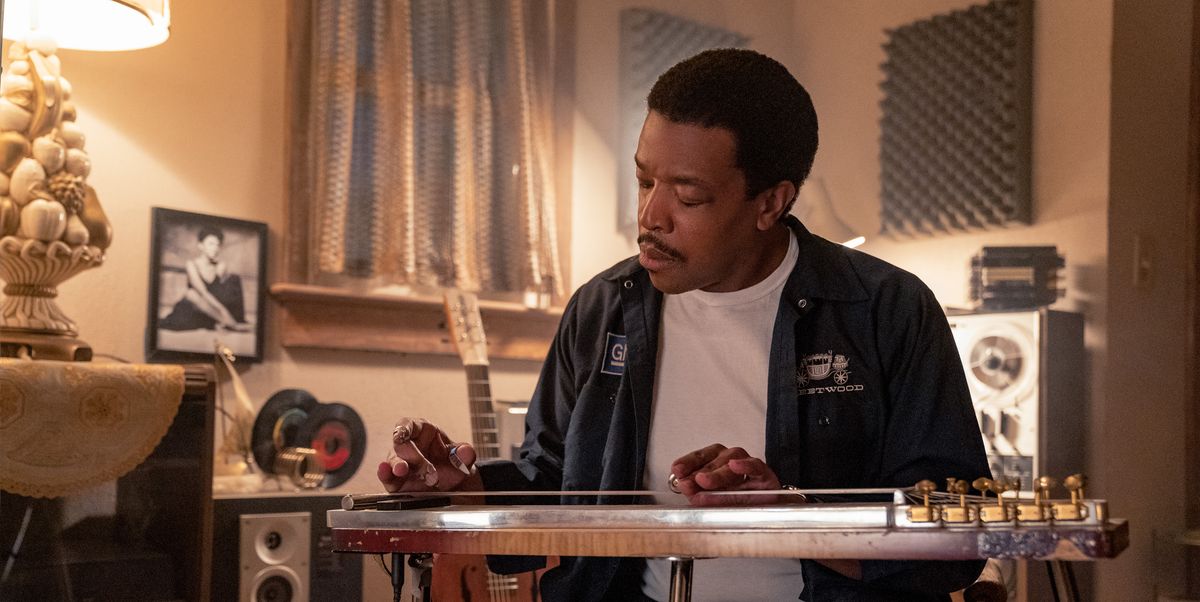Starz’s BMF is organized-crime myth-making at its most potent
The 50 Cent-produced series features a pair of breakthrough performances

At the risk of landing among a gaggle of reviews that ask, “Are there too many television shows about the violent, turbulent world of illegal narcotics?”, we have to wonder exactly that. In considering BMF, Starz’s newest among its stable of drug-trade dramas, it would be derelict not to first consider, much as a drug dealer would, if perhaps the market is flooded. BMF arrives hot on the heels of Raising Kanan, the second series in Starz’s hydra-headed Power universe, a ’90s-set prequel built around the devilish role originated by Curtis “50 Cent” Jackson. When BMF ends its eight-episode first season, the second season of Power Book II: Ghost will immediately take over its corner on Sunday nights.
BMF is itself a distant planet in the Power universe, with Jackson once again executive producing and supplying its boom-bap theme song, and former Power writer Randy Huggins manning the keyboard. But what sets the show apart is its real-life inspiration: Detroit-born brothers Demetrius “Big Meech” Flenory and Terry Flenory, the Black Mafia Family of the show’s abbreviated title. The Flenory boys, since given stiff prison sentences following a 2005 FBI raid, wrested control of the coke market in the ’90s in Motor City and beyond. By the time the brothers were swept up in a racketeering dragnet, they had expanded nationwide and were distributing nearly three tons of product every month.
The series acts as an origin story, beginning as Terry (Da’Vinchi) and Demetrius (Demetrius Flenory Jr., debuting here as his own father) are still in their teenage years and their narcotics enterprise still in its toddling phase. Flashbacks promise to fill in the brothers’ earlier years and their earliest professional motivations, much like Epix’s Godfather Of Harlem, another true-trap drama at the height of its strength. BMF is organized-crime myth-making at its most potent. The show only promises to hew to the basic silhouette of the Flenory saga. (Each episode opens with a “based on a true story” intertitle featuring language even shiftier than the blurb that precedes Fargo.) But, at least early on, the Flenory brothers’ story is vivid enough that the main takeaways are plenty enough to go on.
The pilot includes an attack that leaves a central character with the physical disfigurement that became part and parcel of his street legend, an arc that plays out like a superhero’s ascendance. This formative event and its aftermath make for an irresistible hook in the story’s chronology. But because the Flenory boys are still so young, BMF winds up playing as traditional family drama as often as it does an action series. That’s not a bad thing, but in the four episodes screened for critics, the balance of the elements could use more fine-tuning.
BMF’s putative lead actor is the estimable Russell Hornsby, who stars as Charles, the Flenory patriarch and the requisite workaday parent who’s mortified to see his sons slide into a life of crime. Along with Michole Briana White, who plays the Flenorys’ long-suffering mother, Lucille, Hornsby lends the show its weeping heart. Not many episodes pass before it’s clear Terry and Demetrius will have to raze their old family to build their new one. That’s an affecting and unique part of the story, to be sure, as so many similar kingpin origin stories depict scions growing into the established family business. But the quieter family scenes seem to belong to a version of BMF that can’t survive once the brothers’ empire expands, an inevitable progression that the audience will not only anticipate but crave.
The de facto lead is Demetrius “Lil Meech” Flenory, who makes his splashy debut as a younger version of his infamous father. Such a casting choice is at once obvious and risky, especially when it seems like a bid for verisimilitude at any cost. (Flenory’s biggest physical changes are a different hairstyle and some makeup to cover the massive BMF neck tattoo matching his incarcerated father’s.) That’s not the case here, as Flenory quickly establishes himself as the most interesting character and cast member. His performance is just forceful enough, but he’s totally at ease in the big shoes he’s filling. It’s every bit as much of an unexpected triumph as O’Shea Jackson Jr.’s son-as-father turn as Ice Cube in Straight Outta Compton or Mario Van Peebles’ in Baadasssss!
BMF could also become a star turn for British actor Eric Kofi-Abrefa, who’s stunning here as Lamar, the charming sociopath intent on destroying the Flenory brothers for reasons both professional and personal. Kofi-Abrefa brings a menacing, live-wire energy to the show, evoking a young Clifton Powell in one of his most duplicitous roles. And not to belabor the point, but Lamar is also reminiscent of Kanan, the character that elevated Power from a season-one curiosity to a season-two obsession. When Kofi-Abrefa and Flenory square off, BMF is at its most potent and stimulating.
The passion oozes from this passion project, with Jackson fighting to get BMF across the finish line after years of failed attempts to adapt the Flenory saga. Jackson and pilot director Tasha Smith reportedly went to the mat to cast the untested Flenory Jr., and Huggins, a Detroit native, injects the scripts with local character that sets BMF apart from its coastal-based contemporaries. The show also benefits from a connection to the hip-hop world owing to a record label through which the brothers laundered their money. (Snoop Dogg makes a guest appearance in the first half of the season, while Eminem is set to appear in the back half.) The story of the Flenory brothers presents a unique value proposition, assuming it doesn’t get lost among Starz’s snowstorm.